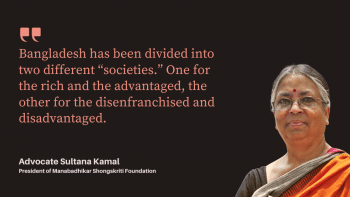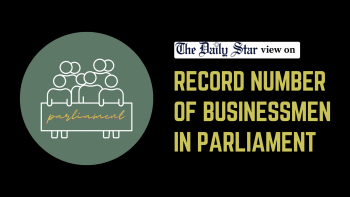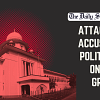From one party to one person: What was de facto is now de jure

We congratulate Sheikh Hasina for winning her fifth term as the prime minister, and fourth consecutively—the longest ever in our history. Today, in Bangladesh, everything is centred around her, which is both a testimony to her ability and how institutions are run. From policies to plans to projects and their implementation, from the macro to the micro, from the bigger picture to the minute details, from tinkering with flyover planning to green chilli preservation—everything has to have her direct consent if they are not to fall into the bureaucratic maze. All the megaprojects and their timely execution can be credited to her. There is a story that a fire brigade team leader, while dousing fire in a high-rise in Dhaka, was reportedly captured on TV referring to the PM's direct guidance through which he and his team were able to bring the fire under control. If it is true, then it is an example of her inexhaustible energy, incredible extent of her interest and total dominance in everything.
According to her supporters, it is deservingly so because no one else before her brought about as much positive change in Bangladesh as she did, a claim not without foundation.
The latest election is another example of her complete control of the most important event in any democracy, made easier by the opposition's boycott, which allowed Hasina a total free hand. There was practically very little interference on election day, as everything was worked out much earlier. BNP proved completely incapable of understanding Sheikh Hasina's strategic thinking and meticulous planning and thought very little of the heavy price they would have to pay, both in the short and in the long run, for their boycott. Hasina's playing of the nationalistic card was bold and brilliant, and her handling of the big powers quite dextrous. Bringing China and India on the same page in supporting her is something many regional and world leaders can learn from.
In terms of Sheikh Hasina's control over everything, the poll outcome tells the story as nothing else could. The Awami League (AL) won 222 seats, while 62 seats were won by the "rebels," 58 of whom were lifelong Awami-Leaguers and were approved by the party. Jatiya Party won 11 seats with AL's blessings. Another two seats won by 14-party alliance members were the result of AL handouts to the extent that they had to use "boat" as their election symbol. So, out of 298 seats whose results have been declared, 293 have been won either by the AL itself or by those it "approved" or "blessed." If we add the 50 reserved seats for women, by far the majority of which will go to the AL, Hasina can easily claim a tally of minimum 45 more, making for a total of 338 MPs in a House of 350. Can it then be termed as anything other than a one-party rule? It can be a case of being too successful for one's own good, for such extreme concentration of power has its own built-in vulnerabilities.
Out of 28 political parties that participated in the election, 23 did not win a single seat, with all their candidates losing their "deposits" proving that they had no public support. They were brought into the fray to hike up the number of parties joining the election only to argue that the polls were contested by many parties.
The only party that could have challenged the AL in any meaningful way—the BNP—was so heavily crushed, and over such a long period, that by the time polling time came, it got decimated through police action, endless cases, fast-track conviction and widespread intimidation. As of election day 13,424 BNP leaders and activists were arrested, according to the party. It also claimed that under 499 cases lodged, a total of 52,342 members have been implicated as their names were included in the first information reports (FIRs). The fact that BNP Secretary General Mirza Fakrul Islam Alamgir, a man who commands respect across the political divide, has been in jail since October 29 and denied bail repeatedly—even last Wednesday—says it all.
However, BNP's own policy of boycotting the election, which we consider to have been suicidal, further added to the process of its marginalisation.
The most important outcome of this election is the emergence of Sheikh Hasina as the supreme leader of the country. She has been so for many years now, but the latest election has enormously consolidated that position. What was de facto is now de jure.
Ever since her return from exile in India in 1982, she has been consolidating her power—first within the party and then within the government—through politicisation of the bureaucrats, law enforcement agencies, administration in general and massive distribution of perks and facilities, and finally in the whole country, through total crushing of any opposition and non-partisan dissent, making her its supreme leader.
The outcome of the January 7 election is that there is not a single member of parliament, save two or three, who do not owe his or her membership to her. The parliament, which has for a long time been no more than a rubber stamp of her policies, will now be more so and represent no other party other than the AL and reflect no one else's voice but hers. In the last parliament, BNP at least had seven MPs who did take the government to task whenever given a chance. However, in this one, even that level of discordance will be absent. It will be a chorus all the way.
Absurd as it may sound, so complete is Sheikh Hasina's victory that it will have to be her to determine who the leader of the opposition in parliament will be. So far, the largest group other than AL consists of the so-called "rebels," all of whom want to return to the party. Maybe Sheikh Hasina can persuade them to form the "opposition" and can guide them from behind. Thus, she will be de jure leader of the House and de facto leader of the opposition. An incredible achievement with incalculable danger—the parliament becoming a complete handmaiden and democracy being put on a ventilator with the total oxygen supply in one specific hand.
Self-congratulatory rhetoric aside, there are some hard messages for the winning party from the low voter turnout. AL's vote bank is usually considered to be 35-40 percent. So the total turnout of 41.8 percent (per Election Commission data) shows that only AL supporters turned up for voting, and the neutral voters, assumed to be 20-25 percent, stayed away, as well as the vote bank of BNP which is estimated to be 30-35 percent (from previous elections), making for a total of nearly 60 percent voters who stayed away. So the exuberant claim that people overwhelmingly voted the present government to power needs to be examined more objectively, and its in-built lessons learnt.
Simply put, Sheikh Hasina now stands out as the person solely responsible for whatever happens to the country. The economic turbulence that is predicted because of global economic turmoil will all fall on her doorstep, with all blames coming her way. The dollar price hike, the inflation, rising prices of essentials, money laundering, unbearable energy subsidy and the unrest in the global market dipping our export will all come home to roost in the coming months. Already, the former finance minister has announced that all IMF conditions cannot be met. In the June-December period, we could not maintain our foreign exchange reserves as asked. This may not be the first of other defaults that may follow.
During the last decade and especially the last five years, corruption increased by leaps and bounds; denying it will only amount to burying our heads in the sand. The rising amount of non-performing loans is sucking the very "blood" out of our banking system, and the main business houses responsible for it continue to receive official favour. The banks' internal governance system has been weakened, making the sector more vulnerable and putting the whole economy at risk. The issue of good governance has been ignored alarmingly, with vital institutions abandoning its own rules and accountability. The weaponising of the legal system and its selective use will definitely weaken the confidence of the global business community, which is of vital importance if we want to increase foreign investment. The prime minister assured us that the economy will be her main focus. We urge her to start her new tenure by taking decisive actions on the problems identified above.
The all-encompassing victory may not be as smooth a sailing as it looks on the surface. For the fact is that victories naturally glitter, but absolute victory inevitably blinds.
Mahfuz Anam is the editor and publisher of The Daily Star.
Views expressed in the article are the author's own.
Follow The Daily Star Opinion on Facebook for the latest opinions, commentaries and analyses by experts and professionals. To contribute your article or letter to The Daily Star Opinion, see our guidelines for submission.

 For all latest news, follow The Daily Star's Google News channel.
For all latest news, follow The Daily Star's Google News channel. 










Comments